 There is no flower more nostalgic than the big beautiful blossoms that cover herbaceous peony bushes in spring. They are fabulous in the garden, a vase, and bridal bouquets. Their colors, forms, and texture make them eye catchers in any situation and their foliage adds beauty to the border throughout almost all the gardening season. They require little care once established and will live and bloom for many years. With over 900 cultivars for sale in the US there are enough choices to fit almost every want or need. Here are some characteristics to consider when buying peonies.
There is no flower more nostalgic than the big beautiful blossoms that cover herbaceous peony bushes in spring. They are fabulous in the garden, a vase, and bridal bouquets. Their colors, forms, and texture make them eye catchers in any situation and their foliage adds beauty to the border throughout almost all the gardening season. They require little care once established and will live and bloom for many years. With over 900 cultivars for sale in the US there are enough choices to fit almost every want or need. Here are some characteristics to consider when buying peonies.
1. Color
Color is probably the characteristic that tops the list of most people. Pink is the color that usually comes to mind when I first think of peonies with white or dark red close behind. But if you look closely many pink, red or white peonies also have large, numerous, conspicuous yellow stamens.
Example: ‘Doreen’ (magenta-rose, Japanese, 32” tall, midseason)
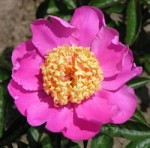
There are peonies that are completely yellow.
Example: ‘Prairie Moon’ (pale yellow, single, 32” tall, midseason)
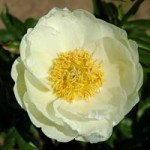
A few peonies are lilac.
Example: ‘May Lilac’ (lilac, single, 32”, early)
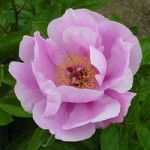
A new color in peonies is coral.
Example: ‘ Coral Sunset’ (coral flowers with ruffled edges fade to ivory, semi-double, 32” tall, early midseason)
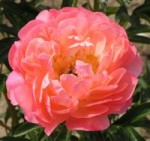
Some peonies are two shades of the same color.
Example: ‘Pink Derby’ (outer petal bright pink, inner petals light pink and cream; bomb-type double, 26” tall, midseason)
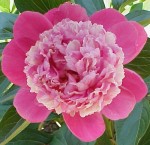
A few peonies have petals with contrasting colors.
Example: ‘Athena (white with raspberry flares, single, 30”, very early)
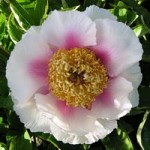
Some peony bushes will bear flowers of two different colors on the same bush.
Example: ‘Mister Ed’ (pink and blush cream bomb-type, double, 36” tall, midseason)

2. Number of Petals (also called Form)
You may have noticed that the peonies shown above have vastly different number of petal or petal-like structures. Peonies have been divided into 5 different forms.
a. Single is the simplest form. Five or more petals are arranged in a single row around a center of pollen bearing stamens
Example: ‘White Innocence’ (white, single, 48” tall, late midseason)
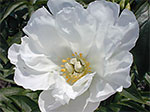
b. Semi double: Five or more wide petal arranged around a center of pollen bearing stamens mixed with petals.
Example: ‘Salmon Dream’ (Pink, semi-double, 32” tall, midseason)
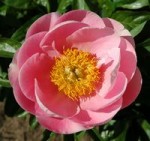
c. Japanese: Five or more petals around a center consisting of wide stamens that have no pollen (stamenoides).
Example ‘Sword Dance’ (Red petals with yellow red streaked staminodes, Japanese, 36’ tall, late)
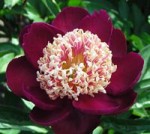
d. Double: Five or more outer petals with stamens (in the center) transformed into petals giving the flower a full round appearance. Since the stamens have been transformed into petals, double flowers are often sterile.
Example: ‘Tourangelle’ (apple-blossom pink with cream-white shading at the base, double, 36” tall, midseason)
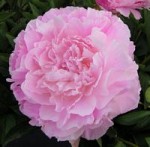
If the outer petals around a center of smaller petals forms a mound this flower is said to be a bomb type double.
Example: ‘Angel Cheeks’ (light pink, bomb type double, 32” tall, midseason)
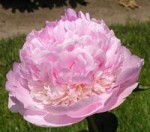
3. Fragrance: Some peonies have it and some don’t and those that do vary in the type of scent and include:
Rose scent
Example: Ann Cousins ( white, doble, 32’ tall, late)
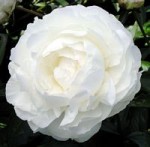
Clove scent
Example: Red Charm (deep red, bomb-type double, 32”, early)
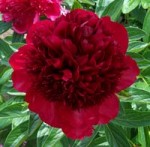
Lemon
Example: ‘Bartzella’ (yellow, semi-double to double, 34” tall, midseason)
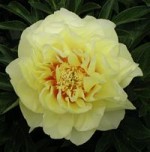
Spicy
Example: ‘Carnation Bouquet’ (pink, double, 32” tall, midseason)
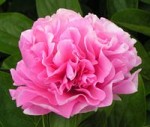
4. Stem Strength: if you hate to stake this characteristic could be important.
Needs staking
Example: ‘Jayhawker’ (pink, double, 36” tall, midseason)
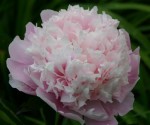
No need for staking
Example: ‘Big Ben’ (red, 36” tall, early midseason)

5. Use
Some peonies are very good cut flowers.
Example: ‘ Baroness Schroeder’ (blush to white, 35” tall, midseason)
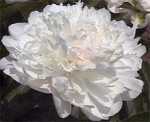
Some peonies dry well.
Example: ‘Dresden Pink’ (pink, double, 36’, late)
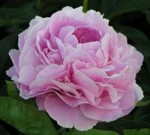
6. Time of Bloom: The exact time of bloom is dependent on your location so the bloom time is a relative. Most are midseason.
Very early (late March in the South, mid-April further North)
Example: ‘Sugar and Spice’ (salmon-orange, single, 24’, very early)
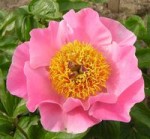
Early
Example: ‘Pink Hawaiian Coral’ (coral, semi-double, 34”, early)
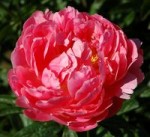
Midseason
Example: ‘White Frost’ 9white, double, 36” tall, midseason)
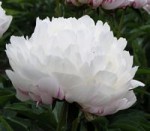
Late 94-6 weeks later than the early ones)
Example: ‘Sword Dance’ (red, Japanese, 36’ tall, late)
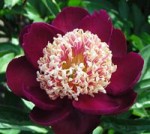
7. Height: Most peonies vary in height from short to tall, with most somewhere in between.
Short
Example: ‘Border Charm’ (yellow, single, 22” tall, midseason)
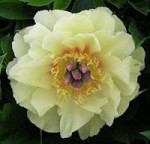
Tall
Example: ‘Henry Bockstoce’ (cardinal red, double, 40” tall, midseason)
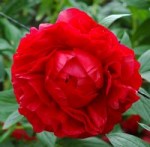
8. Foliage:
Divided
Example: ‘Edulis Superba’ (Pink, double, 36″, midseason)

Finely cut
Example: Paeonia tenuifolia rubra plena (red, double, 14” very early)
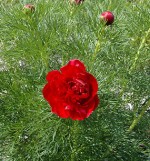
9. Chill Requirement: Most peonies require a certain number of chilling hours to break dormancy, grow and flower but some are tolerant of moderate zone 8 winters.
Example: ‘Kansas’ (red, double, 36’, midseason)
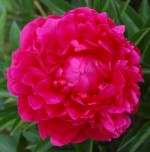
Many combinations of characteristics are available so do not be restricted by the peonies shown above. Your local nursery will probably have a very narrow range of choices but on line sources have many, many more. All of the peonies I have used to illustrate various characteristics are available on line at such places as at www.peonyparadise.com. Order for fall planting.

I had a beautiful peony blossum, for the first time, this summer. I have
never seen one like it before. This was in my garden when I purchased
the property in 2003, but never blossumed. The outer edge is pink, next
row is yellow and the center is pink. Would you know the name of this
one? Thanks. Maureen. Tried to send image but did not know how to
do it. Thanks again.
Maureen,
Sorry, I can’t ID your peony but do a Google search of images for “yellow peony” and you may be able to find yours. Alternatively do a Google search on “Adelman peony growers Oregon” . They a huge selection with a very nice online catalog that might show yours. The yellow ones are somewhat unusual.
Good luck,
Karen